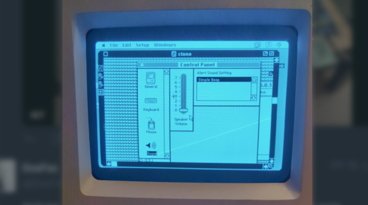Apple 2011 WWDC tracks reflect emphasis on Mac and iOS gaming
The technology tracks for WWDC 2011 are nearly identical to last years', apart from the fact that "Graphics & Media" is now titled "Graphics, Media, and Games." Other tracks target Application Frameworks, Internet & Web, Developer Tools, and Core OS.
While last year's Graphics & Media track included lots of material for game developers, ranging from Game Center to OpenGL ES optimizations, this year's track now gives gaming prominent billing, and not just for iOS.
"iOS and Mac OS X deliver an amazing lineup of technologies for developing cutting-edge games, innovative graphical applications, and platform-optimized audio and video experiences," Apple's WWDC overview page states.
"See how your apps can harness a layered set of graphics frameworks to create accelerated 3D rendering, rich 2D drawing, dynamic animations, and image effects. Dive deep into the powerful capabilities of OpenGL, OpenGL ES, and OpenCL, and gain insights into the expert techniques and profiling tools used to attain maximum performance.
"Understand how AV Foundation provides a modern interface for working with time-based audiovisual media and find a range of sessions on building innovative applications for capturing, editing, and streaming media. Learn how technologies like Game Center can dramatically enhance the gameplay experience of your iOS titles and find out how the best games take full advantage of the platform."
WWDC Evolution
The past WWDC events have rapidly expanded Apple's focus on gaming, starting with the iOS SDK launch in 2008, which received much of its initial inertia from iPhone games and titles that carried and eventually defined the iPod touch, which Apple now advertises almost exclusively as a handheld gaming device.
Just four years ago, Apple's chief executive Steve Jobs told developers at WWDC 2007 that the company expected them to deliver web apps for the new iPhone rather than native titles built using a Cocoa SDK (which he denied at the time having any intent to ever deliver), a strategy similar to HP's webOS, RIM's web-based PlayBook, Google's Chrome OS and its focus on web-oriented Android development.
The launch of a native "Cocoa Touch" iPhone SDK in 2008 resulted in three tracks at that year's WWDC: iPhone, Mac, and IT, a track aimed at organizations deploying Mac servers and managing networks of Macs. As the iPhone OS expanded to become iOS with both the iPod touch and iPad, it has not only taken a larger role at WWDC but has largely crowded out Apple's stagnant server business. The IT track has since been discontinued.
While some have predicted that Apple would eventually leave Mac OS X behind to focus on iOS, the company has instead worked to continually share technologies between the two products, which share the same Core OS, many major APIs and the same Xcode development tools.
Melding iOS and Mac development, App Stores and Design Awards
Rather than continuing to address iOS and Mac developers as separate groups, Apple now includes tracks that include information of interest to both, ranging from Application Frameworks to Core OS to Internet and Web and Development Tools.
Last fall, Apple introduced Mac OS X Lion at an event entitled "Back to the Mac," which described a variety of iOS features and concepts that would be making an appearance in the next version of the company's desktop and notebook operating system, including full screen apps, multitouch gestures, autosaved documents, and the new Mac App Store that Apple rushed to open within 90 days of announcing it.
Apple has quickly focused on the iOS and Mac App Stores as the way to distribute third party software for its products, making WWDC 2011's Apple Design Awards exclusive to titles available from the company's App Stores. Last year, Apple limited its awards to iOS titles, announcing top iPad and iPhone apps without any consideration of Mac titles.
 Daniel Eran Dilger
Daniel Eran Dilger













 Amber Neely
Amber Neely
 Thomas Sibilly
Thomas Sibilly
 AppleInsider Staff
AppleInsider Staff
 William Gallagher
William Gallagher
 Malcolm Owen
Malcolm Owen
 Christine McKee
Christine McKee










16 Comments
I really hope there will be some true integration with Apple tv, it can be such a hit to play games.
So I guess we'll have to wait till June to see if there's an iWork 11.
I really hope there will be some true integration with Apple tv, it can be such a hit to play games.
How long before the iPhone, iPod and ATV get the A5 and the new '9 x faster' gpu chip?
It would be great to have an ATV app store along with the iPod and iPhone. If they all run on the A5 sooner or later...they're essentially the same thing?
A game you have on your iPad is on your ATV. The iPod becomes the wireless controller for the ATV?
The ATV could be a neat little console in that context with the power of a PSII/Wii. And many people have found their graphical capabilities more than acceptable. A few hundred million can't be wrong. With a gyroscope controller, the monster app store and A5 capabilities...the ATV can more than rival the Wii, at least until the iPad can do wireless gaming to a hi def TV...which (latency restricting?) could be a while...
I'm waiting for the ATV to get the expanded app and gpu treatment the iPad, iPhone and iPod have.
Surely, a matter of time. Apple have even giving 'Games' a top billing in one of their WWDC development tracks..?
Lemon Bon Bon.
...and the ATV is dirt cheap for an Apple product.
That an an iPod and you can a nice casual gaming set up to rival the Wii or a 'still played' PS2. With the value added Apple eco system, compelling choice!
Then there's the iPad 2 where games aren't even built from the ground up for it yet. But the initial results of quick optimisations show much promise.
Lemon Bon Bon.
The ATV, iPod, iPad, iPhone love 'triangle' is going to make interesting viewing over the next couple of years.
I just see a juggernaut that is going to stream roller traditional notions of electronics, gadjets and media integration.
Exciting times.
Lemon Bon Bon.